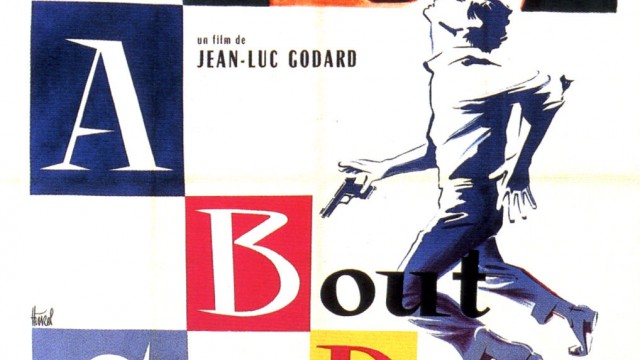We all have A bout de souffle (Breathless) to thank for creating the very way films demonstrate in a visual manner time passing via the method of jump cuts. Numerous other films during the French New Wave utilized this particular technique of filmmaking, as well as works from George Melies, but the renowned popularity of A bout de souffle handily has made the feature the most lauded motion picture that brought the innovation of the jump cut to conventional visual storytelling.
For me, that part of its production (which is genuinely a monumental achievement) is perhaps the most interesting thing to say about A bout de souffle, which comes up short in the themes and characters it presents. Oh it’s not a bad film by any definition of the word, but even its visual motifs and the majority of its imagery don’t have a lot of substance for one to chew on once the story is done. That story, speak of the devil, that A bout de souffle tells concerns a man named Michel (Jean-Paul Belmondo), who has just killed a cop in a fit of fear.
He spends time with an American woman named Patricia (Jean Seberg) as he tries to avoid the authorities, with the twos conversations providing the best scenes of the entire film. Godard has a serious gift it seems for staging and writing extended conversation sequences, with the best scene of the entire film coming from Patricia and Michel exchanging introspective slices of dialogue related to life, pregnancy and facial expressions. Problem is, these portions of the motion picture work like gangbusters as their own individual entities, but placed into the confines of a 90 minute feature, the structure of the tale begins to strain on the viewer. Part of the problem comes from the fact that Michel, a character who we, the audience, spend the majority of the film with, is both predominatley unplesant to be around and has very little in the way of depth to speak of.
That’s a reoccuring problem for the entire movie though, with a shockingly low amount of substance being generated in the films meager plot, and even the engaging discussions can’t fend off an impending sense of fruitlessness. Is A bout de souffle trying to use the characters brash mannerisms and contempt for authority as a way to convey a nihilistic attitude towards society? Is Patricia a tragic physical manifestation of naive yearning in a world gone mad? The interpretations one could draw from this films plot are numerous, and while that’s undeniably kind of exciting, I never really got the feeling from the way the film executed its story that there seemed to be any sort of layers to its characters or plot points. Plus, It just seemed like sequence of events that Godard found interesting enough to spend the energy necessary to bring them to life as a film.
If that’s the case, I’m legitimately happy for him for having that sense of dedication to his craft, as well as advancing the very foundation of visual storytelling via the features editing methods in the process. But as for me, I just didn’t find A bout de souffle as a whole to be all that compelling, though it certainly has one or two scenes relying on excellently written conversations that manage to be flat-out riveting. Nevertheless, those particular parts of the movie just weren’t enough to carry the rest of the effort to the finish line for me, rendering A bout de souffle an audacious, frequently gripping film that fails to come together as a greater whole.


